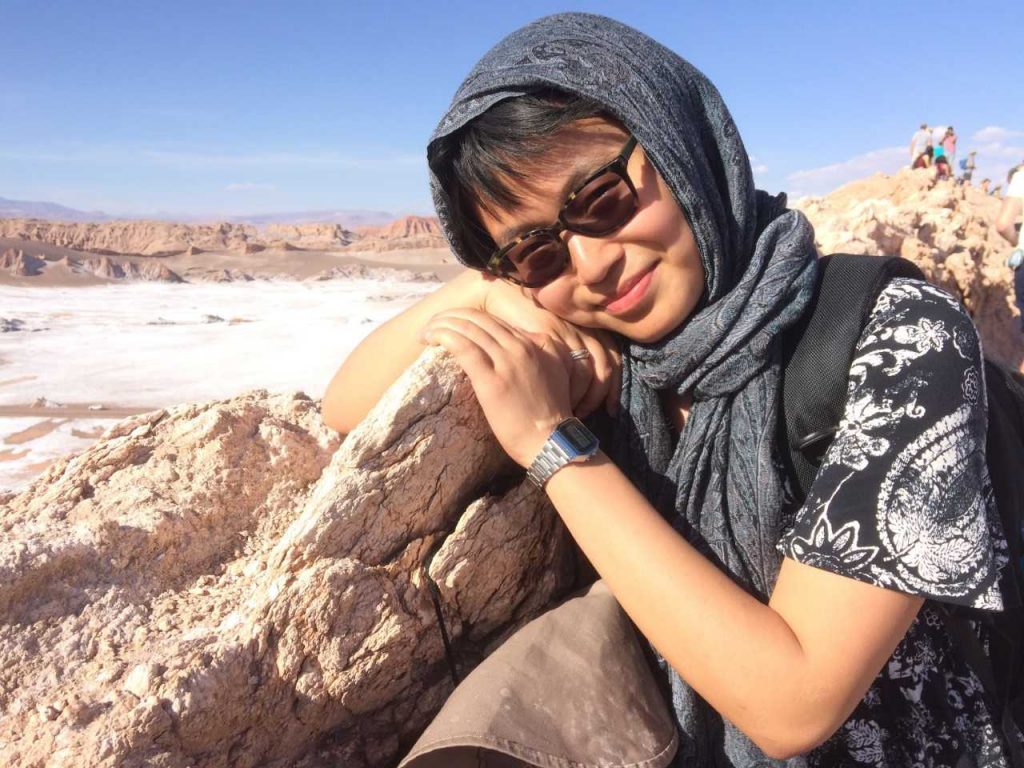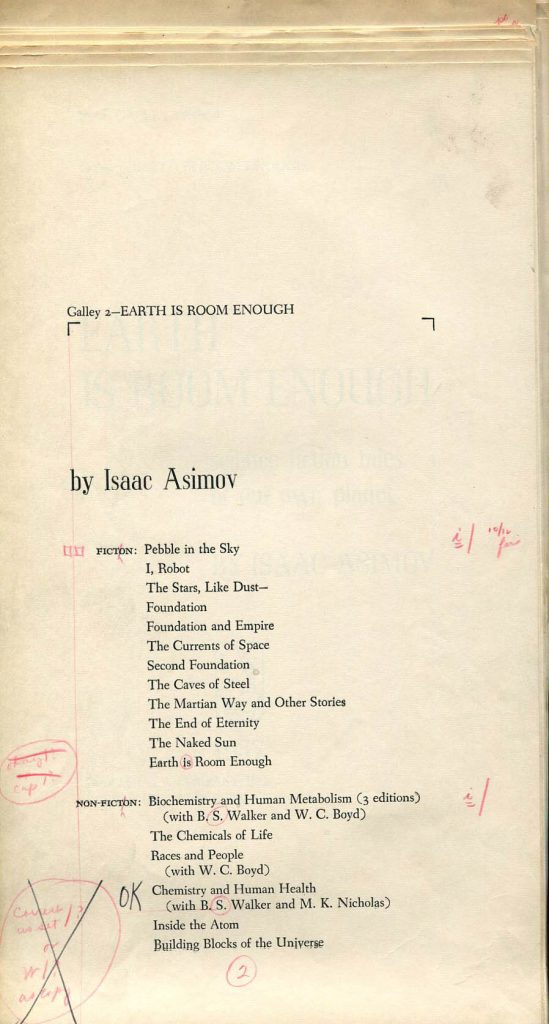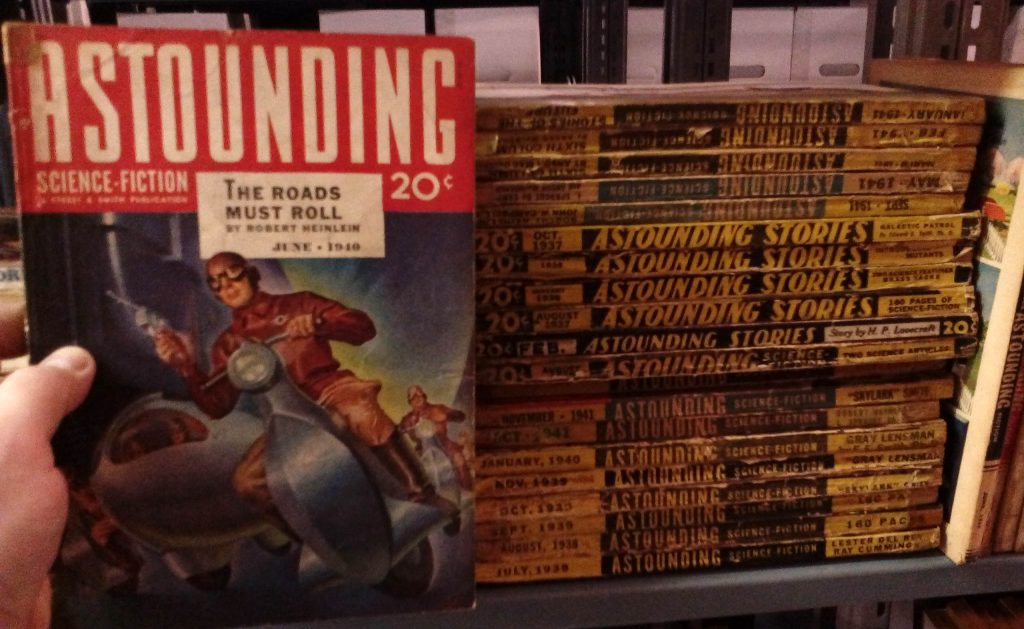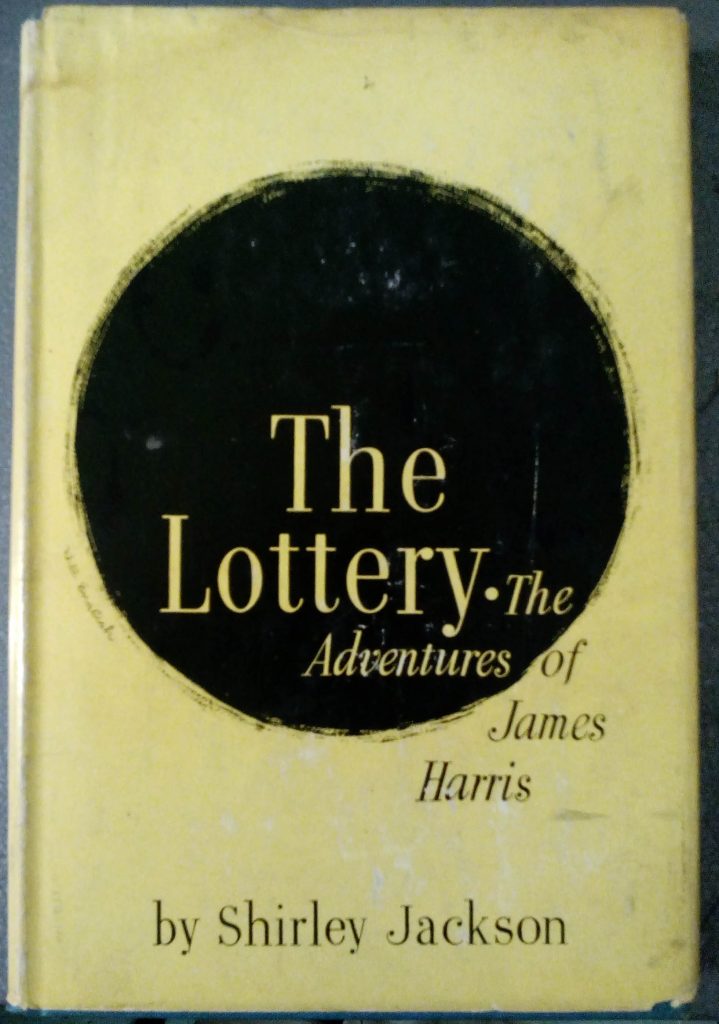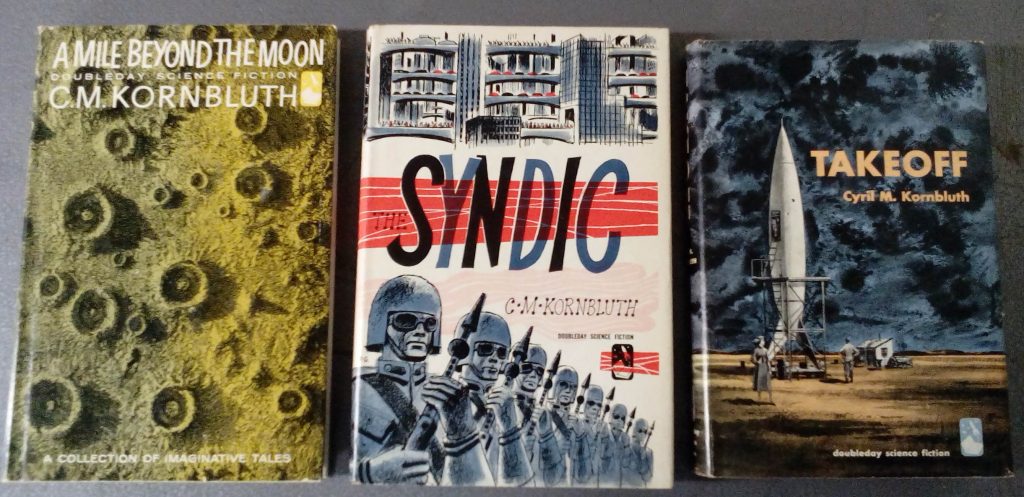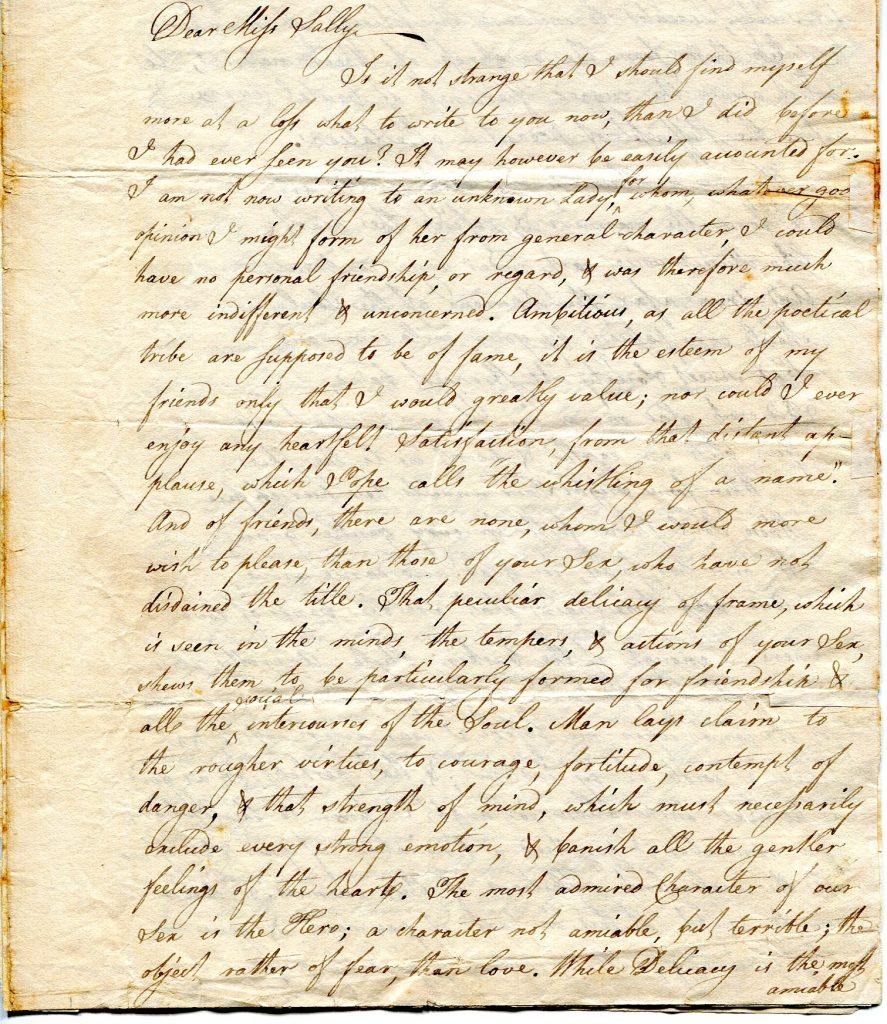The Watkinson is extrememly pleased to announce the donation of a fine and extensive private collection of science fiction novels and pulp magazines, acquired over the course of sixty years, given by Lofty Becker of West Hartford, CT, a professor (emeritus) at the University of Connecticut specializing in constitutional and criminal law.
Here are a couple of high-spots of the collection, to whet your appetite (see the end of this post for further pics of covers, etc.):
 In 1953, Ballantine released a limited edition run of Ray Bradbury’s book-burning novel Fahrenheit 451 that might survive a visit from the firemen. Two hundred numbered and signed copies of the book (ours is number 46) were bound in Johns-Manville Quinterra, a chrysolite asbestos material. The copies are much sought after by collectors.
In 1953, Ballantine released a limited edition run of Ray Bradbury’s book-burning novel Fahrenheit 451 that might survive a visit from the firemen. Two hundred numbered and signed copies of the book (ours is number 46) were bound in Johns-Manville Quinterra, a chrysolite asbestos material. The copies are much sought after by collectors.
Another jewel of the collection is the original typescript of Philip K. Dick’s Eye in the Sky, along with a copy of its first edition (Ace paperback) issued in 1957! Also, the final galley proofs for Isaac Asimov’s 1957 (Doubleday) collection of short stories under the title Earth is Room Enough.
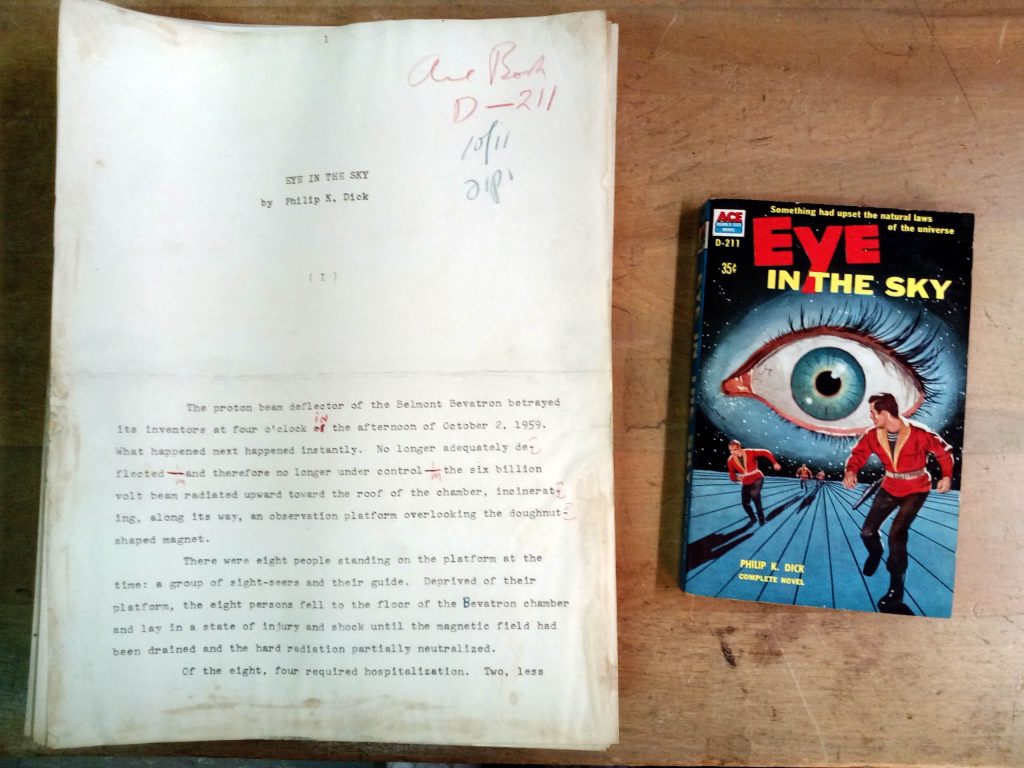 Thousands of other volumes are in the collection, from Asimov to Zelazny, as well as issues of early pulp magazines!
Thousands of other volumes are in the collection, from Asimov to Zelazny, as well as issues of early pulp magazines!
The following is a history of the formation of this collection in the words of its compiler, Loftus (Lofty) E. Becker, Jr.:
I started reading fantasy and science fiction in May 1954. I was 9 years old and home sick from school. After I had finished “The Count of Monte Cristo” my mother brought three issues – April, May, and June – of The Magazine of Fantasy and Science Fiction to my bed. (Those days cover dates on magazines were when they were removed from newsstands, so the June issue had been on sale since early May.) I read Robert Heinlein’s “Star Lummox” (published in book form as The Star Beast) and was hooked. Before I went back to school I’d read everything in those three issues.
My father – Loftus Sr. – had long been reading fantasy, and some science fiction. Every month he brought The Magazine of Fantasy and Science Fiction home from a newsstand. That didn’t give me enough to read, and when I ran out of science fiction in the children’s library section my parents got permission for me to take out “adult” books. In addition, our family excursions most weeks were to Estate Book Sales in Washington, D.C. – the only secondhand bookstore open on Sundays. My father would take his children along and pay for any books we wanted to buy. I got a lot of Edgar Rice Burroughs (John Carter of Mars) there.
I was particularly taken with Heinlein, L. Sprague de Camp and Fletcher Pratt, Clifford Simak, and Hal Clement, but I’d read anything I could find and buy anything I could afford. Mostly that meant Astounding and Galaxy magazines at newsstands. When we moved to Long Island in 1956, my allowance was higher and I started taking the train into New York City every weekend to browse the many secondhand bookstores on 4th Avenue below 14th St. I also began visiting Gnome Press’s headquarters on 11th Street. Marty Greenberg, the publisher, would sell me Gnome books for a dollar, and I got quite a few.
When we moved back to Washington, D.C. in 1957, I discovered the Washington Science Fiction Association (WSFA), an active fan club with monthly meetings. I was able to buy a few books and magazines from members there – I got 30 of the first 31 Astoundings for $30 from one man who was running out of space, and a number of Arkham House books from Robert Madle – who is still alive and selling secondhand science fiction by mail order at the age of 97.
In addition, I discovered that 9th Street N.W. had three secondhand bookstores with reasonably good science fiction collections. One – George Friend’s – had a large collection of remainders available for $1 and accessible only by climbing a tall ladder. No bookstore these days would let a 13-year-old climb that high up, but George let me and I got quite a few books from him. I also discovered a store on Staten Island that would let me place a standing order for every science fiction paperback published. At the start that meant 10-15 a month. I kept it up through college, but not long after that the bookstore went out of business.
My father was smart enough not to buy “The Lord of the Rings” until all three volumes were out. That meant we didn’t suffer the agony of waiting for two years to find out what happened to Frodo, captured by orcs at the end of the second volume. The problem was that Papa had priority, so I could read them only when he wasn’t home and I wasn’t at school, so I had several 20-hour agonies of suspense. Reading them turned me into a Tolkien enthusiast. I even started making my own index of the books (which Tolkien told me not to publish since he was doing his own). My mother got unbound sheets of The Silmarillion and bound a copy in leather for me. That’s the one book I’m holding back from the gift (there is another copy, not leather bound, in the collection).
Thanks to WSFA, I also was able to go several of the annual science fiction conventions – Pittsburgh, Chicago, and Los Angeles. At the first I won a copy of H.P. Lovecraft’s Beyond the Wall of Sleep in a lottery. It was second prize; first prize was The Outsider and Others, which went to a friend. I later bought it from him for $100. At others I bought a Phillip K. Dick typescript, and some original illustrations, at auction. I was also able to meet many of the authors and editors I admired – Heinlein (very gracious to a young admirer), Asimov, de Camp, Robert Silverberg, and some others. I even had an hour’s conversation with Anthony Boucher (bought at auction) – in which he turned me into an enthusiast of Wagner’s Ring cycle.
My parents moved to Paris in 1959, but I stayed in D.C., which meant I had to get my own subscription to Fantasy and Science Fiction. I’ve one had ever since. (I could have bought a lifetime subscription for $100, but sadly didn’t.) When I went to college (1961) and law school (1966) I was in towns with fewer good sources of secondhand books but kept looking.
My mother moved to Havertown, Pennsylvania, in a house that finally had space for all my books and magazines on shelves. Alas, part of that space was in the basement, which flooded. My mother was a professional bookbinder and was able to salvage many. Still, I lost a lot of paperbacks (the covers stick together when wetted), and the first few issues of Amazing Stories.
After graduating law school and starting work, I had less time to read and the bookstores were drying up (the 9th Street bookstores in D.C. were all gone). I still kept prowling what I could find, filling in the Arkham House collection (I paid $150 for Out of Space and Time, the hardest to find) and sometimes finding better copies – generally copies with dustjackets to replace books my father had bought. I never did find a decent American copy of Heinlein’s Starman Jones. For a while I subscribed to Easton Press’s series of leatherbound signed editions but either my tastes or theirs changed and I finally dropped it.
I’ve bought very little since about 2000. I’ve kept up my subscription to Fantasy and Science Fiction, but dropped Analog (formerly Astounding) a few years ago.
(Loftus E. Becker, Jr.)
